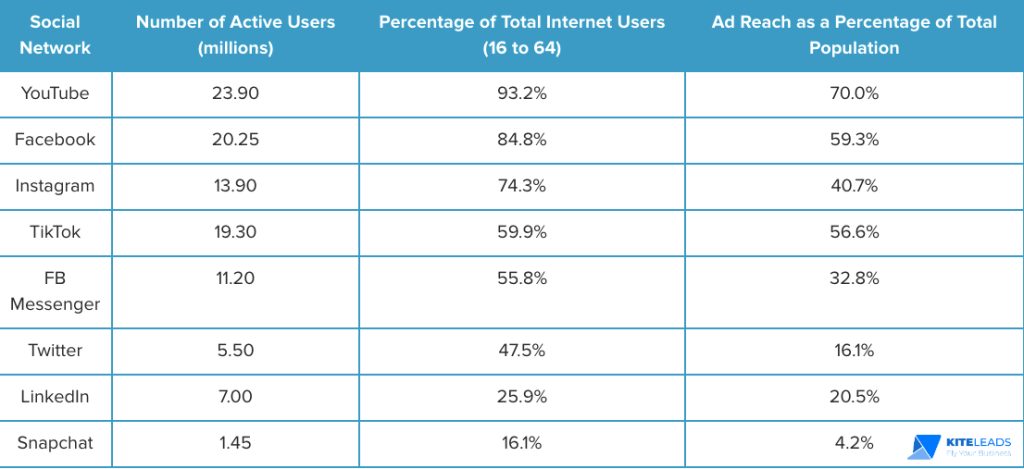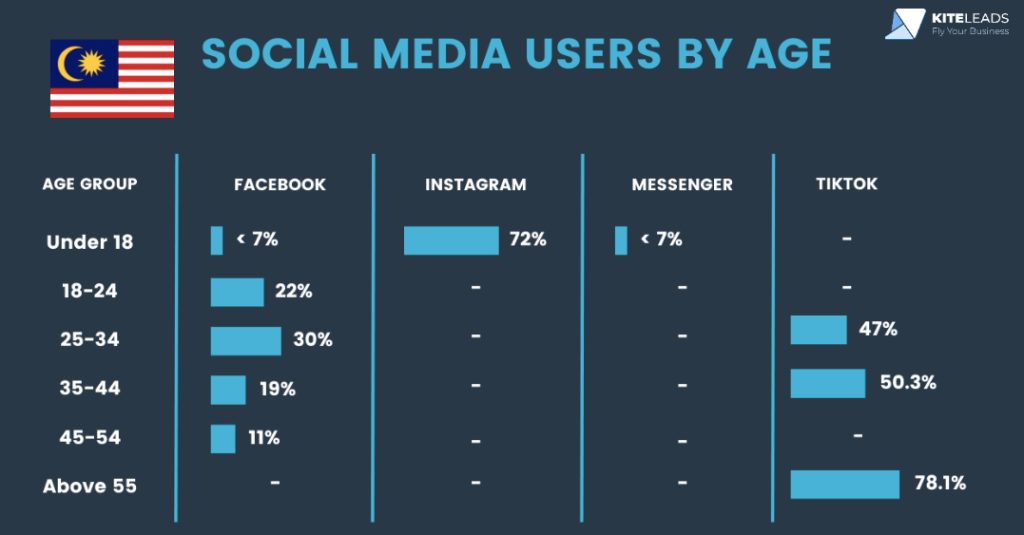Social Media in Malaysia: 2024 Insights and Trends
Malaysia is one of the fastest-growing economies in the Asia-Pacific region, and this growth is mirrored by the country’s high levels of social media usage. In 2023, Malaysia had an internet penetration rate of 96.8%, placing it 10th globally for internet use. Out of a population of 33.5 million, around 30.25 million Malaysians were active in 2022, representing 91.7% of the population. Among adults, social media usage is nearly universal, reaching 99.8%.
This high engagement is not new; Malaysians have been active on social media since its early days. In 2011, Malaysian Facebook users had some of the most active networks globally, with an average of 233 friends per user. For businesses and marketers, this widespread adoption represents a significant opportunity to reach a large and engaged audience. Below, we explore the latest statistics and trends in Malaysia for 2024.
Is Social Media Still Growing in Malaysia?
Despite already high internet and social media penetration levels, Malaysia continues to see impressive growth in usage. From 2021 to 2022, there were 2.3 million new social media users, a remarkable increase given the existing saturation. Although this rapid growth may slow down in the coming years as the market matures, the country is expected to add approximately 400,000 new adults each year, keeping the potential for growth alive in the short term.
Youth engagement is exceptionally high, with 67% of Malaysian youth on social media. A survey conducted in 2022 at Universiti Kebangsaan Malaysia found that 92.7% of pre-university students aged 17-19 used it daily, with 52% logging in more than seven times a day.
Another factor contributing to social media growth is the rise of eCommerce. As online shopping becomes more prevalent, primarily through apps like Instagram and Facebook, usage increases alongside it. Malaysia’s eCommerce sector is expected to see the highest growth rate in the ASEAN region.
Social Media Habits of Malaysian
In 2022, Malaysians ranked sixth worldwide for daily online time, averaging 9 hours and 4 minutes daily. However, by 2023, this number decreased by 11%, with Malaysians spending an average of 8 hours and 6 minutes online. Of this time, about 2 hours and 47 minutes were spent on the platforms, down from 3 hours and 11 minutes the previous year. This decline is consistent with global trends, where people spend less time online due to reduced pandemic restrictions and digital fatigue.
Most Popular Social Media Platforms in Malaysia
Malaysia’s most popular social media platforms in 2023 include YouTube, Facebook, Instagram, and TikTok. YouTube leads with 23.9 million active users, followed by Facebook with 20.25 million. Instagram and TikTok also have a strong presence, with 13.9 million and 19.3 million users, respectively. WhatsApp is the most popular messaging app, outpacing even YouTube in terms of sheer number of active users. Other popular messaging apps include Telegram, FB Messenger, and WeChat.
Regarding content consumption, platforms like YouTube, Facebook, and Instagram dominate. YouTube, for example, has over 1,000 channels and over 1 million subscribers from Malaysia. Popular searches on the platform include movies, music, and the animated series “Upin Ipin.”

Social Media Users by Age
Across platforms like Facebook, Instagram, and Messenger, the largest group of users is aged 25-34, making up about 30% of the user base. This is followed by the 18-24 age group, which accounts for 22%. Notably, middle-aged Malaysians (aged 35-54) also represent a significant portion of social media users, making up around 30% of the ad audience in Malaysia. Senior citizens and teenagers each comprise a smaller, but still notable, share of users.
On Instagram, 72% of users are aged 13-34, with women dominating all major aprimaryoups. Conversely, TikTok is particularly popular among young adults, with 18-24-year-olds making up 50.3% of the audience.

Key Social Media Trends in Malaysia for 2024
- High Social Engagement: Malaysians are highly active on social media, primarily using it to stay in touch with friends and family. Entertainment and news consumption are also significant drivers of social media use.
- Middle-Aged Users: In contrast to many other countries where social media is primarily dominated by younger generations, a significant portion of Malaysia’s social media audience is made up of middle-aged individuals. This demographic is especially active on platforms like Facebook and Instagram.
- Selectivity in Content Consumption: With the reduced online time, Malaysians are becoming more selective about the content they engage with. Quality over quantity is becoming increasingly important, especially for advertisers seeking attention in a competitive market.
- Social Media Saturation: With more than 90% of the population already using social media, Malaysia is nearing saturation. While there is still some room for growth, especially as new adults enter the population each year, the growth rate is expected to slow.
Most Used Mobile Apps in Malaysia
In terms of monthly active users, WhatsApp and Facebook are the top apps in Malaysia, followed by Instagram and Telegram. TikTok, while lower in terms of monthly active users, leads in terms of downloads, reflecting its growing popularity. The country has strong mobile connectivity, with over 44 million mobile connections, and Android devices dominate the market with a 70.52% share.
Conclusion
Malaysia boasts a well-developed social media landscape with high levels of engagement across all age groups. For marketers, this presents both opportunities and challenges. With a highly discerning audience that demands quality content, businesses must be strategic in their approach to capture and maintain attention. As the country moves towards nearly universal social media usage, the focus will increasingly shift towards delivering high-quality content and innovative marketing strategies to stand out in a crowded digital space.
For more insights and information on digital marketing, contact Kite Leads Media.


Comments are closed